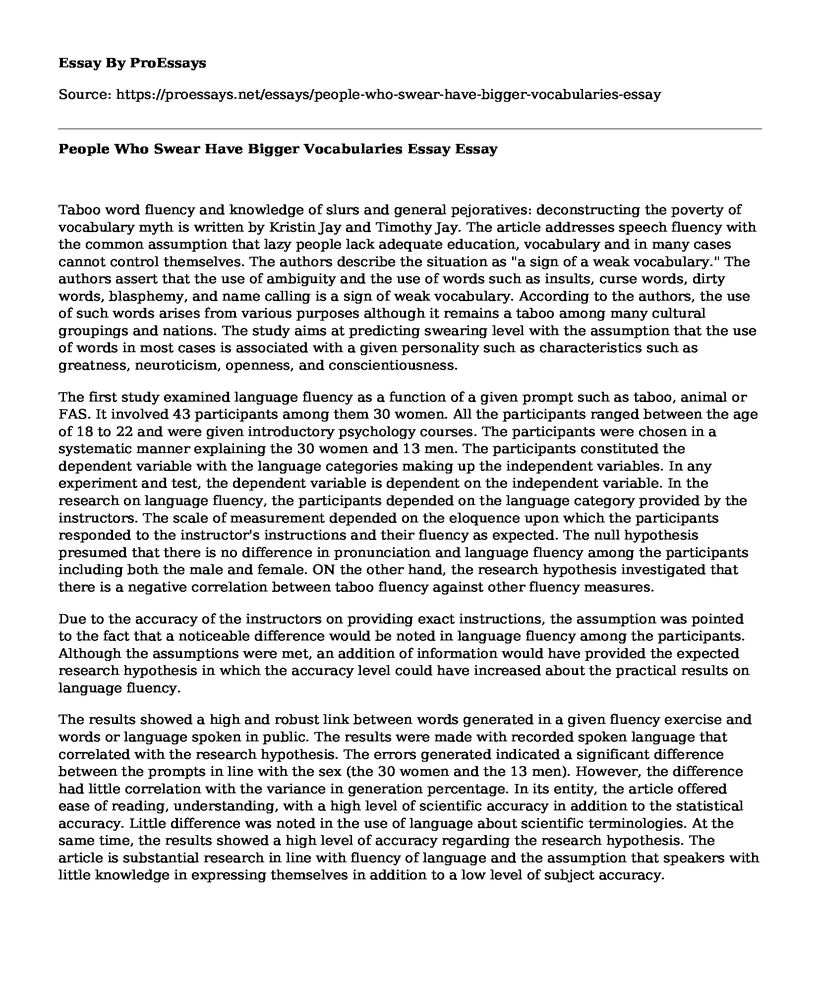Taboo word fluency and knowledge of slurs and general pejoratives: deconstructing the poverty of vocabulary myth is written by Kristin Jay and Timothy Jay. The article addresses speech fluency with the common assumption that lazy people lack adequate education, vocabulary and in many cases cannot control themselves. The authors describe the situation as "a sign of a weak vocabulary." The authors assert that the use of ambiguity and the use of words such as insults, curse words, dirty words, blasphemy, and name calling is a sign of weak vocabulary. According to the authors, the use of such words arises from various purposes although it remains a taboo among many cultural groupings and nations. The study aims at predicting swearing level with the assumption that the use of words in most cases is associated with a given personality such as characteristics such as greatness, neuroticism, openness, and conscientiousness.
The first study examined language fluency as a function of a given prompt such as taboo, animal or FAS. It involved 43 participants among them 30 women. All the participants ranged between the age of 18 to 22 and were given introductory psychology courses. The participants were chosen in a systematic manner explaining the 30 women and 13 men. The participants constituted the dependent variable with the language categories making up the independent variables. In any experiment and test, the dependent variable is dependent on the independent variable. In the research on language fluency, the participants depended on the language category provided by the instructors. The scale of measurement depended on the eloquence upon which the participants responded to the instructor's instructions and their fluency as expected. The null hypothesis presumed that there is no difference in pronunciation and language fluency among the participants including both the male and female. ON the other hand, the research hypothesis investigated that there is a negative correlation between taboo fluency against other fluency measures.
Due to the accuracy of the instructors on providing exact instructions, the assumption was pointed to the fact that a noticeable difference would be noted in language fluency among the participants. Although the assumptions were met, an addition of information would have provided the expected research hypothesis in which the accuracy level could have increased about the practical results on language fluency.
The results showed a high and robust link between words generated in a given fluency exercise and words or language spoken in public. The results were made with recorded spoken language that correlated with the research hypothesis. The errors generated indicated a significant difference between the prompts in line with the sex (the 30 women and the 13 men). However, the difference had little correlation with the variance in generation percentage. In its entity, the article offered ease of reading, understanding, with a high level of scientific accuracy in addition to the statistical accuracy. Little difference was noted in the use of language about scientific terminologies. At the same time, the results showed a high level of accuracy regarding the research hypothesis. The article is substantial research in line with fluency of language and the assumption that speakers with little knowledge in expressing themselves in addition to a low level of subject accuracy.
Reference
Jay, T., & Janschewitz, K. (2008). The pragmatics of swearing. Journal of Politeness Research. Language, Behaviour, Culture, 4(2), 267-288.
Cite this page
People Who Swear Have Bigger Vocabularies Essay. (2022, May 15). Retrieved from https://proessays.net/essays/people-who-swear-have-bigger-vocabularies-essay
If you are the original author of this essay and no longer wish to have it published on the ProEssays website, please click below to request its removal:
- Interactive Teaching Using the Technology-Oriented Framework
- Autism Spectrum Disorder in Children Research Example
- Family Migration Experience Essay Example
- Stance Essay Example: Media and Young Minds
- Paper Example on Gamification in Higher Education: Enhancing Engagement and Motivation
- Essay Example on Creating an Enabling Environment: Theoretical Foundations of Teaching
- Free Paper Sample on Overcoming Tragedy: My Story of Transformation







